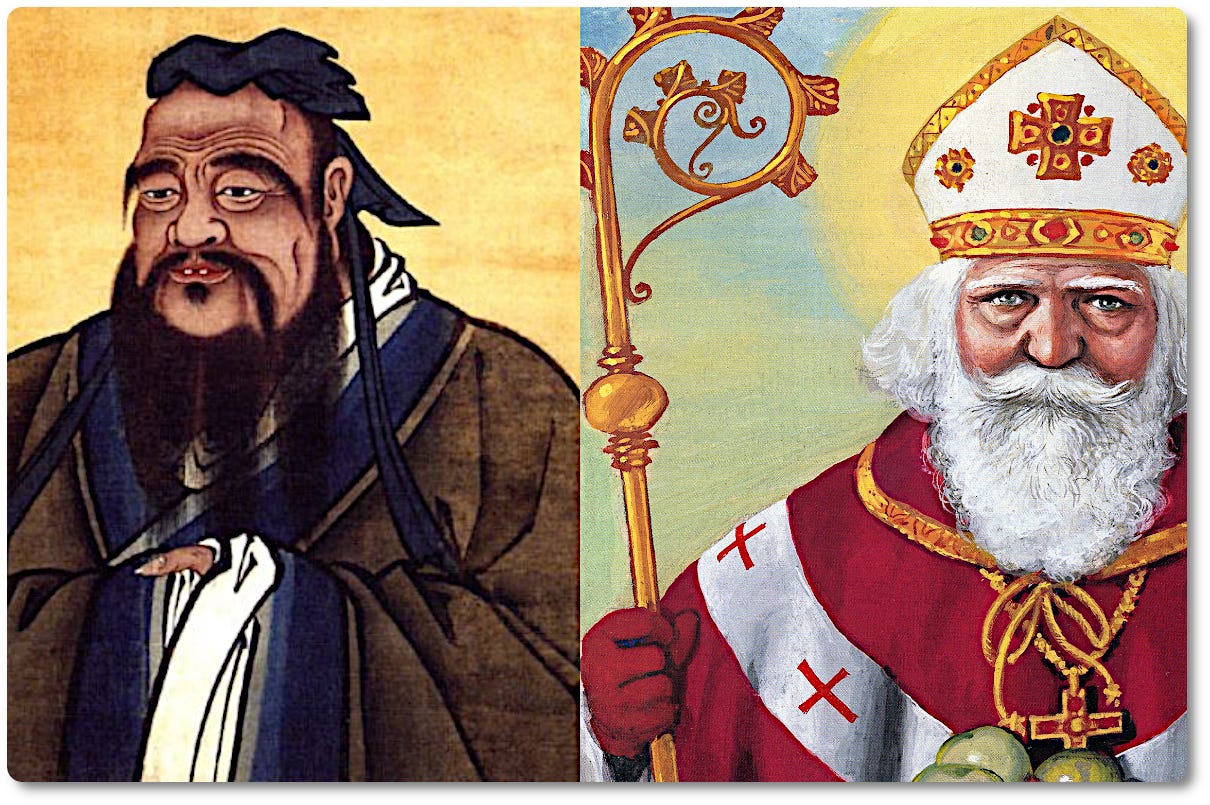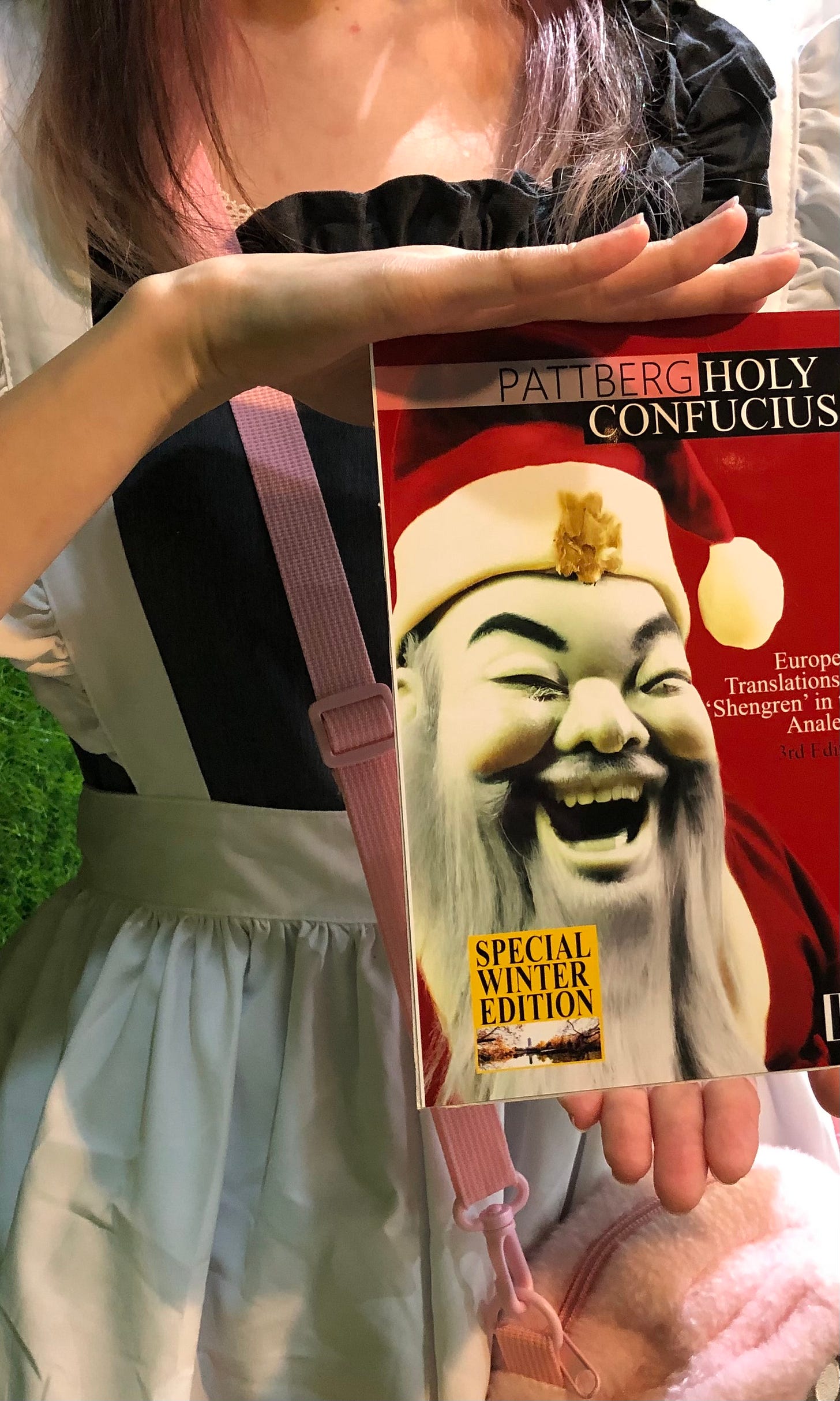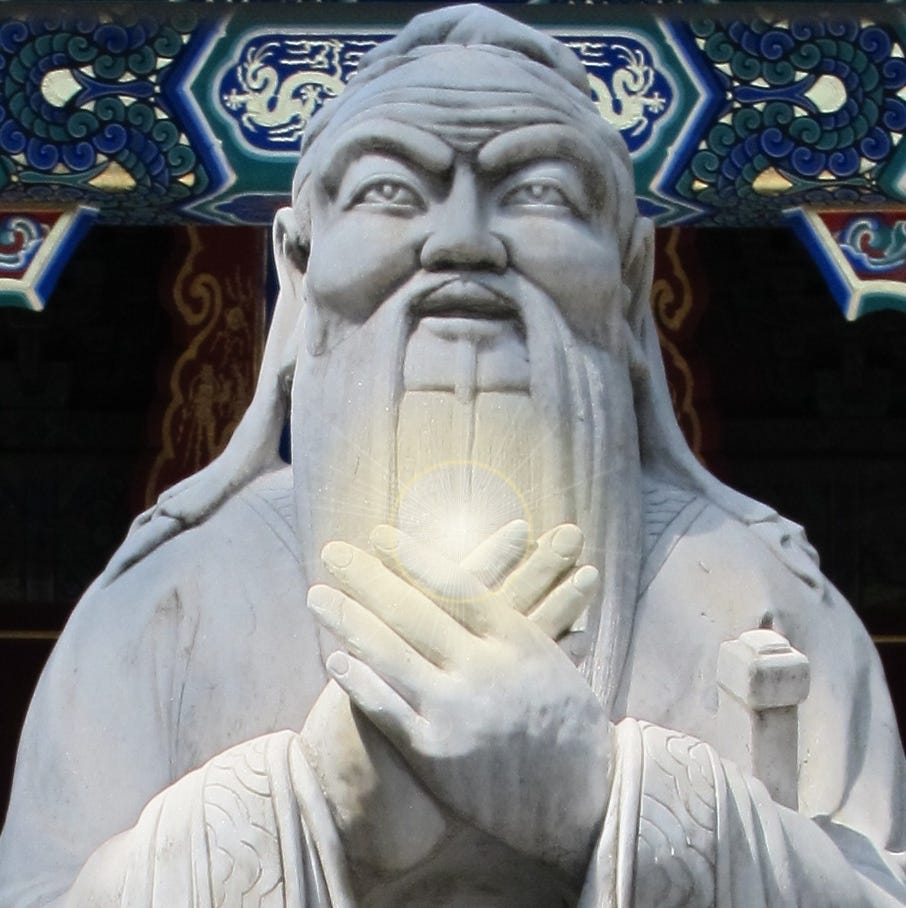HOLY CONFUCIUS! Do Not Confuse The Master With Saint Nicholas
How The Western Plan To Translate China Into Christianity Collapsed
Few people know what Confucius is - not who but what:
The ancient teacher is known by many names; he's King Kung, Master Kong or just K'ung Fu-tzu. But unlike the biblical Saint Nicholas, alias Santa Claus, Confucius isn't a Christian saint but a Chinese sage; more correctly: Confucius a shengren.
The shengren of Confucianism (there are hundreds of them) - like the buddhas of Buddhism - are un-European. They cultivate the ideal personality and become the highest members in the family-based Chinese value tradition.
NOTE: If you are into Translation, or Confucianism and Taoism, consider ordering a copy of HOLY CONFUCIUS! this holiday season. Why, because we must cherish Asian cultures and revive the Chinese shengren! Thanks! And talk to you soon! T
Yet, even in China, there are only a handful of scholars who know about shengren. That's because shengren, this word and concept, has been carefully removed from the history of thought. To the Western missionaries in the 17th century and thereafter, Confucius was erroneously believed to idolize the Christian God, and thus ought to be a true "saint," just like, say, our Western Saint Jerome or Saint Benedict.
In the year 1688 of our Lord, Jesus Christ, Randal Taylor wrote that "the origin of the Chinese nation was not long after the Flood [...] This being so, it must necessarily follow that the first inhabitants of China had likewise the true knowledge of GOD and of the creation of the world."
This was the beginning of the seemingly total Christianization of China. And, today, yes, Beijing lives in the year 2023 of our Lord, and China celebrates a Christmas. In contrast, who in Europe knows, for example, that this year is also the 2,574th anniversary of the birth of Confucius?
Lost in translation
How could China lose its shengren to Western cultural imperialism? The Chinese term sheng appears 260 times in the Huainanzi, 48 times in Mengzi, 132 times in the Chun Qiu Fan Lu, 157 times in Xunzi, 33 times in Laozi, 149 times in Zhuangzi, 40 times in the Yi Qing, and a whopping 185 times in The Records of the Grand Historian. Yet, despite its omnipresence, Western scholars obviously never read those books nor used that term. Why?
As the historian Howard Zinn once wrote: "If something is omitted from history, you have no way of knowing it is omitted." Western efforts to distort China's originality by translation knew no restraint: the British, the French, and the German philosophers, the theologicians and storytellers, they all called K'ung Fu-tzu everything but by his true term; they called him, fashion-wise, a philosopher, a saint, a magus, a teacher, or a sage, whatever floated their theory at that time.
Tens of thousands of other Chinese (and other foreign) key concepts were excluded from world history this way. In effect, translations made China drop out of the humanist project and made her look as if she had no originality at all.
Some scholars have argued with me that China must engage in a dialogue with the West - they mean "in English language." To this I add, yes, but only if the Chinese bring their own terms to the tables. Otherwise the so-called dialogue with the West will always be a Western monologue. In practice, this would mean to identify the untranslatables, and to promote them. Most writings of European "China experts" today are inadequate because they describe a China without Chinese terminologies.
Traditionally, European thinkers translated China at will, always according to their own cultural predicaments. For example "the sage/le sage" became today's preferred (neutral) translation of shengren only in Britain and France, but not so in Germany. The all-favored German word is the biblical "Heilige," meaning saint or holyman. The reason is simple: German language, in contrast to English and French, reserved the noun phrase of "sapientia" (a Latin term for wisdom) not for persons but for fairy tales and legends.
In addition, German language is deeply biblical.
A Confucian Christmas
The first major German book in print was Luther's translation of the Bible. Unsurprisingly, the word "heilig," meaning holy, follows the Germans like a dark specter wherever they venture; that's why the works of Karl Guetzlaff and Richard Wilhelm, for example, read like biblical bedtime stories.
The German language, frankly speaking, is uniquely disqualified from translating the Chinese tradition which is entirely non-Christian, while the English language is just a one-eyed man among blind people. No European language so far had the power to correctly translate Chinese cultural key terminologies.
As long as Western China scholarship floats on misleading European terminology, the West isn't learning anything new from Asia. In this century, it will be necessary to depart from some Western erroneous translations. The East isn't just an appendix to the Western lingo; it has more to offer than the West could ever satisfactorily translate.
The key is to adopt Chinese terminologies. So that, one day, we may have something, anything really, to celebrate for being truly and faithfully global.
End.







Colonialism isn't pretty and the missionaries are not here to help. That seems to be takeaway from this story. I wonder if our new masters are taking away the proper names in America too, once this shitshow is over. I mean, come on. They call themselves Jews and Philosophers in Jamestown. The whole Latin New World mundus narrative by Vespucci was BS.
I agree - your books opened my eyes to Shengren. I was discussing the confused communication of the Chinese elite with the China-based influencer Shaun Rein. China isn't really a Marxist state and the economist Michael Hudson says that to lecture in China he was told that mentioning the fact that he was an ideological Marxist, his father was a Marxist political prisoner, or preaching ideological Marxism in China could see his jigs in China cancelled and himself deported and banned. But there is endless veneration of the Sabbattean Messianic charlatan and British intelligence asset Marx and Marxism in China. Shaun Rein said that he himself has tried to impress on the Chinese elite the fact that most westerners today loath Communism and the Chinese government propaganda stating that the Chinese government was Communist and democractic at the same time may mean something meaningful to the Chinese but seems laughable to the average westerners and all those people who think their governments are democracies because they have routine elections. Instead of describing their civilisation through their own terms and explaining it to the world the Chinese are bending themselves backward to fit their terms into western hegelian ideological formats thinking that the white man is impressed by it. Overall only a weakening of Judeo-Romano-Germanic elite financial and political power through war (possible), revolution (unlikely) or sheer economic intellectual and cultural degeneration (ongoing) will let the Chinese see beyond the 'magical white western world' and think in their own terms. I believe when the post-80s born generation of Chinese find their footing in the party and start to control it the new narrative will emerge. The post 80s and 90s nationalist generation of China are the most contemptuous and adversarial anti-semetic and anti-western group of people in the world. Sensing this emerging situation is why the David Goldmans and Frank Gaffneys of this world have moved on from annihilate the worlds Muslims (which is 50% achieved) to the nuke China now platform.